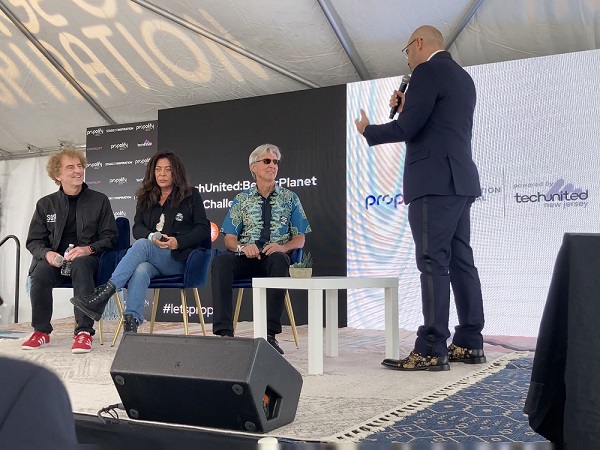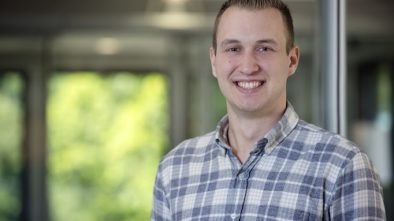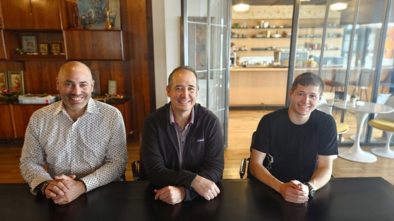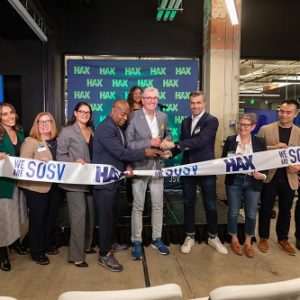Georgia Startup ParkENT Cycles Takes TechUnited:NJ BetterPlanet Challenge at Propelify
PSEG to also work with the two other challengers, both from New Jersey
During Propelify on Oct. 6, the audience at the Stage of Inspiration heard from the finalists of the TechUnited:BetterPlanet Challenge, a partnership between TechUnited:NJ and PSEG. A $50,000 cash prize was at stake, as well as a foot in the door at PSEG, a huge regional utility and energy company, and mentorship by PSEG executives.
When he announced the winner, however, PSEG chairman and CEO Ralph Izzo noted that his company planned to work with all three of the startups “because everything they had to say was something that I know we will be actively involved with.”
In September, TechUnited:NJ had included 12 startups in a Semi-Finals pitch event, which featured presentations from 10 companies in the clean transportation arena; and those participants were narrowed down to the three that pitched before judges at Propelify.
As Richard T. Thigpen, senior vice president for corporate citizenship at PSEG, had said at the Semi-Finals, “The future belongs to those who are prepared for it. And the challenges of climate change, the challenge of demographic change, the challenges of new expectations from customers and a new clean energy economy, all require us to think differently about how to protect the future. And we think that working with the innovation community is one of the smart ways to help us continue to do what I think is our corporate purpose, which is to help make New Jersey a better place [in which] to live and work.”
During Propelify, Izzo said, “I can’t think of any more pressing problem right now than climate change. And the number-one source of carbon emissions in America today is transportation. So, we need to electrify transportation at the same time we decarbonize electricity. Working with TechUnited gives us a network of people that, quite candidly, we don’t often get to interact with.”
The three semifinalists who made the cut were each brought up to make a very quick pitch. They were:
ParkENT
Thad Oviatt, founder and CEO of ParkENT Cycles (Atlanta, Ga.), the ultimate winner of the $50,000 prize, told the panel of judges that three times as many electric bikes were sold last year than electric cars, but there are only eight locations across the nation for charging them. This is an opportunity to create 300,000 locations for charging electric bikes, he said: “a $2 billion domestic opportunity.” The company had just deployed its first secure e-bike charging station in Atlanta. Customers include businesses, corporate campuses and municipalities, he said.
Izzo asked Oviatt what he would do with the money, and Oviatt responded that he would expand his business, completing the nine other charging stations the company has in production right now. There are only two people in his startup, so he also hoped to hire someone else to help. When he gave Oviatt the award, Izzo said that he thought this small startup would make the best use of the funds and mentoring.
Hit Nano
Christopher Abram, of HiT Nano (Bordentown), was next up to pitch. HiT Nano was founded at Princeton University and has remained in New Jersey. Abram asked, “How do we accelerate the electrification of transport?” And then he gave his answer: “In a vehicle, the battery is the most expensive part. And in the battery, it’s the cathode material that’s the most expensive and difficult to produce. The challenge is to produce cheaper cathode materials using green manufacturing methods in order to lower the cost and reduce the lifetime environmental footprint of batteries in electric vehicles.”
HiT Nano provides solutions for the next generation of energy-storage materials, and has a manufacturing process for cathode materials. The process is completely different from that currently used, he said, and it reduces costs by 80 percent. One of the judges, Wendy Neu, chairman and CEO of Hugo Neu Corporation (Kearny), backers of the Kearny Point Industrial Park, which houses many innovation companies, asked if Abram had considered the full life cycle of the materials he was using, including their safe disposal. Abram said that they were looking to reduce the amount of cobalt in the materials. “Cobalt is toxic, expensive and is mined in politically unstable countries under dangerous conditions,” he said.
IoTecha
Last up to the stage was Oleg Logvinov, president and CEO of IoTecha (Cranbury), who told the judges that 35 percent of pollution is generated by transportation, and in order to reduce that 35 percent, “we need to electrify transportation.” According to Logvinov, the way to accomplish this is through intelligence. IoTecha has developed intelligent charging infrastructure, featuring a motherboard for powering intelligent chargers that will allow its customers to build interoperable products “in no time, with very little expense,” he said. Logvinov added that all of the development work had been done in New Jersey by members of his team.
In a response to a question from judge Sean O’Sullivan, managing general partner at SOSV (Princeton), Logvinov noted that his company had raised $30 million so far. He said that they would use the $50,000 to add jobs at their office in New Jersey. “Every person means more electric vehicles on the road.”
While the judges were busy coming to their decision, Aaron Price, TechUnited:NJ president and CEO, asked Logvinov what he thought was the most important thing about the contest. “Cash is important,” Logvinov answered. “But the more important thing is building relationships” in a huge ecosystem, such as the one he participates in, which involves all aspects of electric vehicles and a wide range of players.




